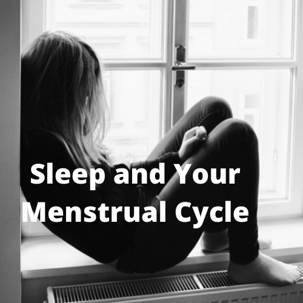
For women, there is that time once a month when you experience your menstrual cycle. However, the menstrual cycle is not isolated to just those 3-7 days. There are often extra-cycle symptoms that affect women a majority of the days in a month. If there are numerous symptoms or the severity of them is great, then you may be diagnosed with PMS or PMDD. A common symptom that women with PMS or PMDD experience is insomnia. Continue reading to find out how your menstrual cycle may be negatively impacting your sleep.
The Basics of the Menstrual Cycle
The menstrual cycle is a process that takes place in a woman's reproductive tract that involves the release of an egg, and the body's preparation for potential fertilization and pregnancy. It typically takes place every 21 to 47 days and consists of four phases:
- Menstrual phase - Implantation of the women's released egg does not take place because it is not fertilized. Therefore, the endometrial lining that proliferated in the days beforehand, sheds as the unfertilized egg does not need a thick cushion to settle in. Women have a menses, or bleed, typically for 3-7 days.
- Follicular phase - This phase consists of the development of an egg in the follicles of the ovary and begins on the first day of the menstrual cycle (or the first day of bleeding). This process typically lasts for 13 days.
- Ovulation phase - On about day 14, the egg is released from the ovaries into the fallopian tube in preparation to be fertilized by sperm.
- Luteal phase - This phase lasts for approximately two weeks after ovulation. If the egg is not fertilized, then the menstrual phase commences and the cycle begins all over again.
PMS vs PMDD
PMS stands for premenstrual symptoms. PMS is the name for the number of symptoms that can arise days before your menstrual cycle begins and even into the beginning of your period. These symptoms can be very bothersome and have the power to disrupt one's life.
PMDD stands for premenstrual dysphoric disorder and refers to having at least five symptoms associated with PMS, as well as emotional or mental disturbances. PMDD normally has more severe effects on lifestyle at work, school, and home.
Insomnia and PMS or PMDD
Women who experience PMS or PMDD are more likely to experience symptoms of insomnia compared to women who do not. The symptoms associated with both of these disorders can negatively impact and disrupt sleep. Some of these symptoms include headaches, vomiting, cramping or stomach pain, bloating, fatigue, sensitivity to light or noise, changes in sex drive, emotional or mental disturbances, and gassiness or diarrhea just to name a few.
PMS can cause women to sleep less which can cause excessive daytime sleepiness. PMS can also cause women to sleep more due to the fatigue, and potential depressive feelings they can feel around their menstrual cycle. PMS can also cause women to feel more anxiety which can also have an impact on their quality of sleep.
It's unclear why PMS causes so many sleep disturbances. Research has shown that sleep disturbances are most profound during the luteal phase. The luteal phase tends to increase temperatures in women and be associated with abnormal levels of melatonin. Increased temperature and varying levels of melatonin, a hormone required for sleep-wake regulation, can cause irregular sleep and insomnia.
Menstrual cycles may also affect the sleep architecture of women. Sleep architecture is the flow of cycles of sleep, and normally flows from stage 1 to stage 2 to stage 3 to REM sleep and back to stage 1. However, in women with PMS, they may experience shorter REM sleep which can lead to feelings of restlessness and fatigue.
How to regulate sleep in PMS
It may be difficult to regulate sleep during PMS or PMDD. However, putting yourself on a regular schedule may help your brain overcome sleep disturbances and hormonal fluctuations.
Try putting together a sleep hygiene routine that you follow every day. This will help regulate your hormones and train your brain that it's time to go to sleep. Working out, following a healthy diet, and learning meditations may also help you regulate your sleep and reduce any anxiety or depressive feelings brought on by hormones.
If you have a heavy flow and are often worried about bleeding through your sheets, it may be helpful to get a mattress pad and double up on protection so you can sleep with peace of mind.
If these sleep disturbances are still bothering you, please consider getting a sleep medicine consultation by clicking the button below.
[Sources]:

